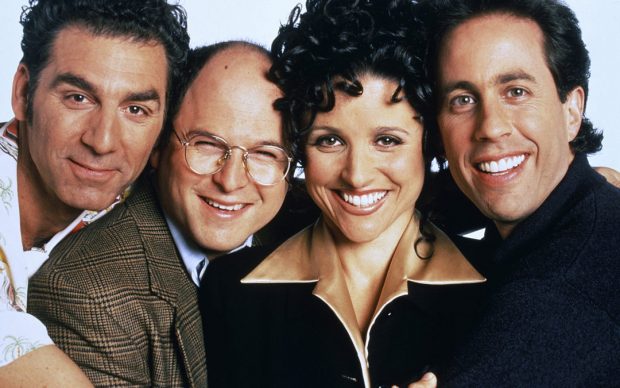They say laughter is the best medicine. It may be the best teacher, too.
One reason the TV series “Seinfeld” has had an enduring impact on American culture is that it takes its namesake’s observational humor and combines it with deeper truths. True, its characters routinely pushed the acquisition of commonsense life lessons into the realm of the absurd. But viewers were able to extrapolate from its wacky scenarios to people and situations they knew in real life.
While it’s impossible to distill the wisdom contained in 180 episodes of a series into anything less than a book, here are five memorable life lessons from “Seinfeld.”

1. Not everyone or everything is sponge-worthy. (Season 7, Episode #9)
“The Sponge” first aired in December 1995, before online birth control was an option. In the episode, Elaine discovers that her preferred method of contraception will soon be taken off the market. This marks the beginning of a sponge-hoarding frenzy as well as a new labeling system for the men she dates. For Elaine, the all-important question becomes, is this new guy “sponge-worthy”?
More than 25 years later, life has sped up to the point where everyone we know is “crazy busy.” We seem to have developed a corresponding awareness that we only have so many hours in a day and so much money in the bank. Life coaches increasingly urge us to identify and eliminate areas of our lives that are, in effect, not sponge-worthy.
Though these lifestyle gurus use different words to express that thought, the overall point is well taken. Before we give our heart, time, or money to anything, we should remember Elaine’s maxim. We’ll be more likely to pause and assess which opportunities are really worthy of our “sponges.”
2. Holding the reservation is the most important part. (Season 3, Episode #11)
“The Alternate Side” aired in December 1991 and features a frustrating exchange between Jerry and a rental car agent. Jerry arrives at the check-in counter and discovers that the agency does indeed have his reservation … they just don’t have any cars. Not surprisingly, Jerry sees no value in a reservation that is taken — and confirmed by the agent’s computer system — but not held.
It’s easy to focus so intently on perfecting our own “reservation system” that we forget why we built it in the first place. Perhaps you embraced the KonMari method and went on a decluttering spree. But taking Grandma’s sewing machine to Goodwill doesn’t seem like such a good idea now that you could be using it to make face masks.
Seinfeld humorously reminds us to take a step back now and then and look at the reasons underlying our actions. Is it possible we’ve lost sight of what’s truly important?
3. Never trust a regifter. (Season 6, Episode #12)
The term “regifting” gained traction as a direct result of this January 1995 episode, entitled “The Label Maker.” As a gesture of thanks, a friend named Whatley gives Jerry the gift of a label maker. The thing is, it looks suspiciously like the one Elaine gave to Whatley last Christmas.
When Elaine confronts Whatley, he admits he regifted the device because the weak adhesive on the labels meant they kept falling off. The irony of this episode is that it exposes a lack of honesty on all sides of the gift transaction. For his part, Whatley wants to appear kind and generous when what he’s doing is getting rid of something he doesn’t want. Elaine and Jerry also fail to be transparent as they jockey to get one of Whatley’s tickets to an upcoming Super Bowl.
The lesson? Watch out for people who want to look like they’re doing a good thing when they really aren’t.
4. You will always think of the perfect comeback days later. (Season 8, Episode #13)
“The Comeback” aired in January 1997 and features George on the receiving end of a co-worker’s well-timed zingers. Thinking that he has finally come up with a showstopping retort, George goes to outrageous lengths — including flying to Akron — to recreate the situation where his co-worker got the better of him.
As improbable as it seems, George’s plan succeeds — at first. He gets his chance to deliver the comeback, but the co-worker responds with an even better put-down.
We’ve all experienced the low-level trauma of thinking up the perfect comeback to a jerk too late for it to be of any use. That’s what makes George’s situation so relatable. Some of us may even have secretly filed away the response “just in case” we ever get to use it.
Of course, that opportunity seldom presents itself, so we are left to stew over our failure to be more quick-witted. By pushing the absurdity of George’s scheme beyond anything remotely resembling real life, “The Comeback” reminds us to be humble. It’s better to admit when someone gets the better of us, take our lumps in real time, and just get on with our lives.
5. Never try to give yourself a nickname. (Season 9, Episode #19)
In the April 1998 episode “The Maid,” George confesses he’s bored with his first name and tries to think up a nickname for himself. Jerry is unimpressed and tries (unsuccessfully) to talk George out of what is sure to be a disastrous outcome.
Unwise and undaunted, George tries to convince his co-workers to begin calling him “T-Bone,” a plan that backfires spectacularly. Not only is that cool-sounding nickname given to someone else, but George ends up with the nickname “Koko.” Why? Because his boss thinks he looks like a monkey while eating a banana.
One reason the George Costanza character is so unappealing is his near-total self-focus. Even when he gets good advice, he ignores it in the misguided pursuit of enhanced status. Who but George would even try to give himself a nickname? Jerry’s admonition, rightly applied, reminds all of us to be more outward-focused and trust others to give us a suitable nickname … or not.
As human beings, we’re more open to processing new information once we’ve let our guard down. If the teacher can make us laugh as they teach — as “Seinfeld” did — so much the better.



